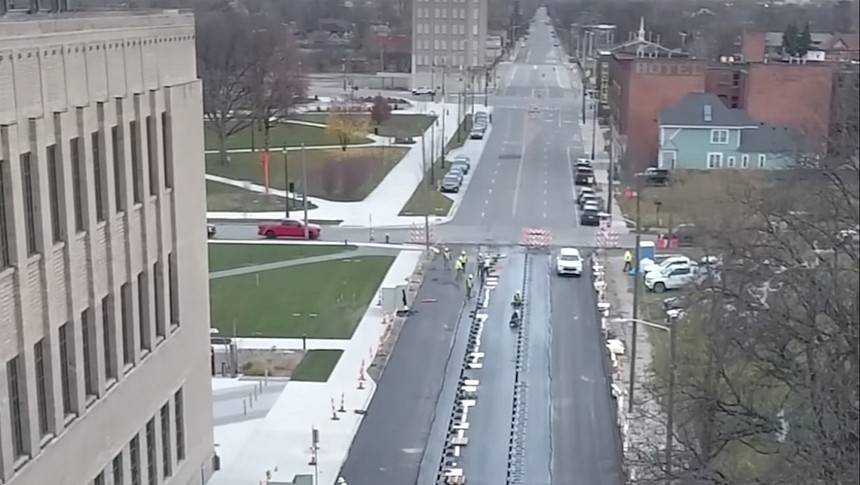There is no need to stop for charging while in Detroit. You actually need to drive to charge your car. The first wireless charging road in North America debuted in Detroit. An electric Ford van has already demonstrated the capabilities of the charging road.
The Biden administration targets having half a million EV charging stations across America. Now Detroit, Michigan, is at the forefront of the charging technology with an innovative system.
The quarter-mile stretch of road is the result of the collaboration between the state of Michigan and the tech company Electreon. The wireless charging section of the road stretches in the Corktown neighborhood, along the 14th Street near Michigan Central and the city’s mobility district.
Many of the latest EV models are equipped with the wireless charging function that simplifies life on board. Now the road operates as a charging pad for the car itself, while the car drives, idles, or parks on the road.
The one that developed the project is the Israeli company Electron, which has already implemented charging roads for electric cars in Israel and for several European roads, such as highways in France, Germany, Italy, Sweden, and Norway. The vice president of the company, Stefan Tongue, explains that the goal is to keep batteries in EVs smaller while extending their range. A small battery is equal to a lower overall weight of the car.
The system is capable of recharging any car that is compatible as it drives down the street. The technology is based on a series of specialized copper inductive charging coils laid beneath the asphalt. Each of the coils is connected to a series of power-managing hubs located on the side of the road. The corresponding receiver is placed beneath the EV. It absorbs power as the car crosses over each of the coils.
There is, though, one condition for the car to be compatible with the wireless charging system. Carmakers have to collaborate with Electreon for the installation of the receivers on the cars.
Right now, Electreon is focusing less on passenger cars and more on means of public transportation like buses or freight transportation like last-mile delivery vehicles.
Furthermore, the company considers that the wireless charging systems can be more efficient on roads that can utilize more charging time instead of highways or other high-speed roadways.
For instance, stop lights and bus stops, where vehicles are stationary for a longer period of time, are locations that can be equipped with such systems. And that is because the technology requires each car to spend some time above the coils to actually charge.
To prove the capabilities of the wireless charging road, Electreon used a Ford Transit equipped with the receiver, driving along the new road in Detroit. During the presentation, the charging rate hit 19 kW. The road, the representatives of the company say, is safe for pedestrians, motorists, and animals.
The quarter-mile stretch of road is the result of the collaboration between the state of Michigan and the tech company Electreon. The wireless charging section of the road stretches in the Corktown neighborhood, along the 14th Street near Michigan Central and the city’s mobility district.
Many of the latest EV models are equipped with the wireless charging function that simplifies life on board. Now the road operates as a charging pad for the car itself, while the car drives, idles, or parks on the road.
The one that developed the project is the Israeli company Electron, which has already implemented charging roads for electric cars in Israel and for several European roads, such as highways in France, Germany, Italy, Sweden, and Norway. The vice president of the company, Stefan Tongue, explains that the goal is to keep batteries in EVs smaller while extending their range. A small battery is equal to a lower overall weight of the car.
The system is capable of recharging any car that is compatible as it drives down the street. The technology is based on a series of specialized copper inductive charging coils laid beneath the asphalt. Each of the coils is connected to a series of power-managing hubs located on the side of the road. The corresponding receiver is placed beneath the EV. It absorbs power as the car crosses over each of the coils.
There is, though, one condition for the car to be compatible with the wireless charging system. Carmakers have to collaborate with Electreon for the installation of the receivers on the cars.
Right now, Electreon is focusing less on passenger cars and more on means of public transportation like buses or freight transportation like last-mile delivery vehicles.
Furthermore, the company considers that the wireless charging systems can be more efficient on roads that can utilize more charging time instead of highways or other high-speed roadways.
For instance, stop lights and bus stops, where vehicles are stationary for a longer period of time, are locations that can be equipped with such systems. And that is because the technology requires each car to spend some time above the coils to actually charge.
To prove the capabilities of the wireless charging road, Electreon used a Ford Transit equipped with the receiver, driving along the new road in Detroit. During the presentation, the charging rate hit 19 kW. The road, the representatives of the company say, is safe for pedestrians, motorists, and animals.




